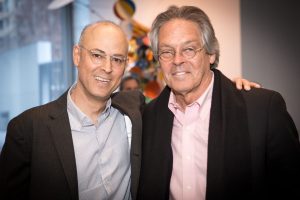Massachusetts Journalist With Alzheimer’s Discusses Life’s Challenges in Podcast

David Shenk and Greg O'Brien, co-hosts of a new podcast on Alzheimer's. (Photo by Lisa Ross)
All his life, Greg O’Brien has had a front-row seat for Alzheimer’s disease. Growing up on Cape Cod, Massachusetts, he was the caregiver in a family of 10 children for his mother. His maternal grandfather and paternal uncle had Alzheimer’s, and his father was diagnosed with dementia and had prostate cancer.
Years later, in 2009, a serious head injury unmasked the disease for O’Brien, who learned at age 59 he had early-onset Alzheimer’s. Just two weeks earlier, he had been diagnosed with prostate cancer, which he chose not to treat. A veteran print journalist, O’Brien turned to writing — both as a strategy for coping with memory loss in daily life, and as a way to help others understand the disease. The words that poured out onto his ever-present laptop screen each day eventually filled 2,000 pages and turned into a book, “On Pluto: Inside the Mind of Alzheimer’s.”
“Shame on me,” O’Brien told Alzheimer’s News Today in a phone interview, “if I don’t write about this to give others hope until there is a cure.”
O’Brien will share his insights as part of a new podcast called “The Forgetting: Inside the Mind of Alzheimer’s,” which is hosted by WCAI, the Massachusetts Cape and Islands radio affiliate of NPR. He’s joined by co-host and author David Shenk, who has spent nearly 20 years writing about Alzheimer’s.
The podcast highlights their friendship, which began when Shenk was making a documentary based on his book, “The Forgetting: Alzheimer’s, Portrait of an Epidemic.” Shenk needed an Alzheimer’s patient who could talk about it clearly. As the two began to engage in deep, raw conversations about the realities of living with Alzheimer’s, they decided to record their dialogues.
“I felt the world could benefit from this kind of candor coming straight from someone who actually is living with the disease, like Greg, with his ability to articulate his thoughts and his generosity of spirit,” Shenk said.
They approached WCAI’s executive producer, Sean Corcoran, and the podcast was born. They recorded the first episode in late 2015, with 12 conversations recorded over a three-year period for Season 1. The first four episodes are available on WCAI’s website, as well as via iTunes, Stitcher and Facebook.
In coming weeks, additional episodes will be released. The plan is to continue to record conversations with O’Brien as his symptoms become more pronounced.
“You can hear the difference from one episode to the next,” Shenk said. “There is a real benefit to having recorded this over a period of time. We wanted to show the progression of the disease until we can’t do so anymore.”
Through these episodes, listeners learn that Alzheimer’s is like being in the basement laundry room when someone accidentally flicks the light off, not realizing anyone is down there.
“The light goes off in your brain and you don’t know what is going to happen,” O’Brien said. “And you yell and scream. And sometimes that rage triggers the brain to go on again. Then it goes off again. And then you know that at some point, there isn’t going to be someone up in the kitchen. The light will go off and nobody is going to turn it back on.”
Living with Alzheimer’s
Other episodes reveal the mysterious woman on the stage beside O’Brien when he was making a presentation, and another about the disconnect in getting lost in his hotel in the middle of the night in Geneva, thinking he needed to make a presentation. Or the rage that almost got him put on the federal no-fly list and how his family supported him anyway. Or the time O’Brien hugged and kissed a girl because he thought he knew her — and she was OK with it.
“Living with Alzheimer’s is like having a sliver of your brain shaved away every day. Yet we can live with Alzheimer’s with hope and humor,” O’Brien said. “You have to laugh at it. If you can’t laugh, the enemy owns you. Eventually, it will take me over, but while I can, I’m going to laugh at its face.”
The podcast also features guest interviews with notable Alzheimer’s experts such as Rudy Tanzi, PhD, a neurology professor at Harvard University. Tanzi, whose side job is playing keyboards for the rock band Aerosmith, wrote and performed the program’s theme music.
Ultimately, the podcast hopes to break down the stereotypes surrounding Alzheimer’s.
“When people think of Alzheimer’s, they think of someone who is 80 years old and in a nursing home,” O’Brien said. The reality is that Alzheimer’s affects people in middle age, with signs that sometimes begin in the 30s, and the disease can take 20 to 25 years to run its course.
Added Shenk: “We need to break through this taboo and candidly talk about Alzheimer’s — as Greg is doing by talking about what he and his family are going through — and urge other people to talk about it. That’s how you can get to a better conversation, improved caregiving and support. It ultimately brings more resources to bear, and fighting and eventually stopping this disease.”







